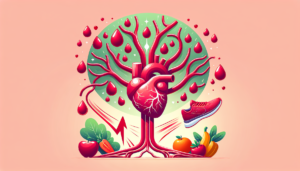How Non-GMO Diets Support Endurance Training
How Non-GMO Diets Support Endurance Training
Understanding Non-GMO Diets
A non-GMO (genetically modified organism) diet emphasizes the consumption of foods that are free from genetically engineered ingredients. Advocates of non-GMO diets often believe that natural agricultural practices contribute to better health outcomes, improve food quality, and promote sustainability. The foundation of a non-GMO diet includes naturally occurring whole foods such as fruits, vegetables, grains, nuts, seeds, and legumes.
Importance of Whole Foods
Whole foods are integral to a non-GMO diet and serve as the backbone for optimal athletic performance. Whole foods are minimally processed and rich in essential nutrients, including vitamins, minerals, and antioxidants, all of which play pivotal roles in supporting endurance training.
-
Nutrient Density: Whole foods provide high levels of nutrients per calorie, essential for athletes who require substantial energy to sustain their training regimens.
- Antioxidants: Fruits and vegetables, which are staples in non-GMO diets, are rich in antioxidants that combat oxidative stress induced by prolonged physical activities.
The Role of Nutrition in Endurance Training
Endurance training demands significant levels of energy and stamina. To meet these needs, athletes must focus on the right nutritional strategies that will enhance performance, recovery, and overall health.
Macronutrients for Endurance
-
Carbohydrates
Carbohydrates are the primary fuel source for endurance athletes. They are stored in the muscles and liver as glycogen, which is utilized during prolonged exercise.
-
Glycogen Storage: Consuming non-GMO whole grains (such as brown rice, quinoa, and oats) helps athletes maximize glycogen reserves.
-
Sustained Energy Release: Non-GMO carbohydrates provide a steady release of energy, maintaining endurance levels during rigorous training sessions.
- Examples: Non-GMO energy gels and bars, fruit smoothies made from organic fruits, and whole-grain pasta can be effective pre- and post-training meals.
-
-
Proteins
Proteins are crucial for repair and recovery after intense workouts.
-
Muscle Recovery: Non-GMO protein sources, such as grass-fed meat, wild-caught fish, and plant-based proteins (like lentils and chickpeas), not only support muscle repair but also provide essential amino acids.
- Timing: Consuming a combination of carbohydrates and proteins immediately post-workout helps in faster recovery and muscle synthesis.
-
-
Fats
Healthy fats play a critical role in long-duration endurance activities, serving as another significant energy source once glycogen stores deplete.
-
Source of Sustained Energy: Non-GMO fats, such as avocados, nuts, and seeds, provide a concentrated source of energy that helps sustain performance during extended workouts.
- Fat Adaptation: Athletes who embrace a non-GMO, higher-fat diet may enhance their body’s ability to utilize fat for fuel, thus preserving glycogen for later stages in a long-distance event.
-
Micronutrients and Their Role
In a high-performing endurance athlete’s diet, micronutrients (vitamins and minerals) also demand attention as they play fundamental roles in energy metabolism, recovery, and overall health.
-
Vitamin C and E
- Antioxidant Protection: These vitamins act as antioxidants, reducing oxidative damage during intense workouts and supporting immune function.
-
B Vitamins
- Energy Production: B vitamins are essential for converting food into energy. A non-GMO diet rich in whole grains, legumes, and leafy greens ensures adequate intake of these nutrients.
-
Iron and Zinc
- Performance Support: Iron is vital for oxygen transport, while zinc is essential for cell division and recovery processes. Foods like spinach, legumes, and quinoa in a non-GMO diet can enhance intake of these minerals.
Practical Application: Non-GMO Foods for Endurance Training
To implement a non-GMO diet effectively, athletes can incorporate various food sources that naturally align with their training needs:
Pre-Workout Nutrition
-
Overnight Oats: Steel-cut oats topped with organic fruits and nuts provide a slow-releasing carbohydrate base, fueling long training sessions.
- Smoothies: Blend bananas, spinach, non-GMO protein powder, and nut butter for a nutrient-rich energy booster.
During-Workout Nutrition
-
Electrolyte Drinks: Opt for non-GMO sports drinks made with natural ingredients or make homemade versions with coconut water, sea salt, and natural sweeteners.
- Dried Fruits and Nuts: These offer concentrated energy and are easy to carry.
Post-Workout Nutrition
-
Quinoa Bowl: Serve cooked quinoa with seasonal vegetables, beans, and a drizzle of olive oil for a balanced meal rich in carbs, protein, and fats.
- Greek Yogurt with Honey: A non-GMO protein source that aids in recovery while offering a subtler carbohydrate boost.
Hydration: The Unsung Hero
Hydration is often overlooked in discussions about diet and training; however, it plays a vital role in endurance performance. Hydration can influence strength, stamina, and the ability to recover after workouts.
Non-GMO Hydration Sources
-
Coconut Water: Naturally rich in potassium and electrolytes, coconut water serves as an ideal beverage for hydration during training sessions.
- Fresh Juices: Juicing non-GMO fruits and vegetables can provide hydration along with valuable vitamins and minerals that combat fatigue.
The Long-Term Benefits of Non-GMO Diets for Athletes
-
Improved Health Outcomes: A diet devoid of GMOs may reduce the risk of certain chronic diseases, enabling consistent training and performance over time.
-
Sustainable Practices: By choosing non-GMO foods, athletes support agricultural practices that promote biodiversity and reduced chemical usage.
- Heightened Mental Clarity: Nutrient-dense foods support cognitive functions, which can improve focus and decision-making during competition.
How to Transition to a Non-GMO Diet
For athletes looking to transition to a non-GMO diet, it may initially seem daunting; however, manageable steps can facilitate this change:
-
Educate Yourself: Understanding the food labels and ingredient lists will help identify non-GMO options easily.
-
Shop Smart: Consider local farmers’ markets and grocery stores that emphasize organic and non-GMO products.
-
Meal Prep: Preparing meals in advance using non-GMO ingredients can streamline the process and ensure consistent adherence to the dietary plan.
-
Experiment: Try various non-GMO recipes, focusing on diversity and including seasonal items to keep meals exciting.
- Monitor Performance: Keep track of how dietary changes affect training and performance to make informed adjustments as needed.
Conclusion
In summary, non-GMO diets present a wealth of benefits that align with the demands and goals of endurance training. By focusing on nutrient-dense foods, athletes can enhance their performance, support recovery, and promote overall health. Embracing a non-GMO lifestyle can lead to sustainable practices that yield beneficial outcomes for both individuals and the environment.








